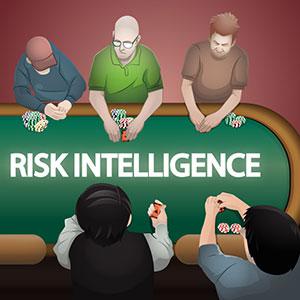The internet is full of information about how to become a great gambler, how to win big at poker, and a whole slew of mostly infomercials touting a winning strategy product. But a system is not the most important factor for a good gambler. There are certain traits a gambler has—both inherent and learned—that contribute to his or her wins. The way a good gambler thinks has nothing to do with luck, and everything to do with the information, and how and when to act on that information.
A Bad Rap

When psychologists study the gambling mind, they mostly study gambling addiction. There is a stigma associated with full time gambling, that it is a sin, a vice, or a disease which results in total ruin. While gambling addiction is a real thing, the motivation behind professional gambling is not governed by uncontrollable impulses or bad judgement calls. To really look into the psychology of professional gamblers, one much first look at the reasons why they gamble, and the motivations behind their bets.
There are definitely those individuals who cannot stop gambling, and they are addicted to the thrill of both winning and losing; the buzz is there for both results. Professional gamblers do not work with emotion, they use reason and mathematical probability to guide their betting decisions. You’ll never hear about a mythical beast called the professional slots player. Slots are totally random, making them great for short term play, but not financially feasible for a professional to base a career upon.
3 Types of Gamblers

According to psychologist/philosopher Dylan Evans, there are three basic types of gamblers. The first type of gambler is the poker star, the rock star of the bunch. The professional poker stars make their money in the limelight, on the tournament circuit, in full view of the world. They love the celebrity status, the thrill of being number one, and the psychology of the game of poker. Poker is largely made up of psychological insights and exercises. The goal is to find the weaker opponent, figure out what cards he has, and convince him your hand is better. The insight of ‘the tell’ and the art of the bluff are the tools of the trade. A poker star also has a colorful nickname like Amarillo Slim or Texas Dolly Brunson.
The second type of gambler is the blackjack player. A blackjack player is applying a system to calculate mathematical probability. For every turn of the card, there is an appropriate type of bet to place in blackjack. A professional blackjack player has already reasoned out the odds of winning in every type of hand dealt, and responds with a bet appropriate for that hand. This type of player does not think in terms of fast cash, but thinks of the long term goal of winning over time. Emotional thrills are not the main motivation for this type of gambler.
The third type of gambler is the sports gambler. Not the computer-informed version who lives on the stats, but the old-fashioned, intuitive sports bettor. This is a special type of gambler who really lives for the game, one who goes to the race track every day, for example, and figures out the probabilities and racing odds, all in their heads. Then they apply this knowledge to win. This type of gambler uses what Evans calls “risk intelligence.”
Risk Intelligence

The ability to gather information from a wide variety of sources and form accurate predictions based on probability is called risk intelligence. In a simple online test, you can get a risk intelligence report. Rather than an IQ test, this is an RQ test. While the familiar IQ test gauges your general intelligence and capacity for knowledge, the RQ test assesses your self-knowledge. It’s not about what you know, it’s about how confident you are in that knowledge.
We are taught facts, figures, and quantifiable information in school. But we are never taught how to apply reason to situations where the results are unknown. By learning how to develop your risk intelligence, you can make better decisions in the face of uncertainty. For the gambler, this means only betting based on the confidence they have of a certain outcome. If the gambler sees a very small probability of winning a particular bet, they will bet accordingly, with a small amount—or not at all. But when the odds are favorable, and with the right amount of risk intelligence, a gambler can win big with one or two carefully-timed bets.
There’s always another Race
The expert gambler doesn’t think in terms of immediate gain. He or she is going for the long haul. A professional gambler doesn’t get caught up in the hoopla of the moment. All those cheering people waving their arms and shouting around the roulette wheel is just a distraction. The skilled gambler looks for the type of game that doesn’t depend on random chance to win and keeps on walking to a poker table or a blackjack table. And when the pro encounters the inevitable losing streak which is bound to happen, the professional gambler walks away then, too. There’s always another race.
Signal or Noise?
What separates the pros from the amateurs is in the way they size up a game. There’s a lot of information out there in the Information Age, but most of it is just noise. Author Nate Silver wrote in his book, The Signal and the Noise: The Art and Science of Prediction: “Every time we choose a route to work, decide whether to go on a second date, or set aside money for a rainy day, we are making a prediction about the future. Yet from the financial crisis to ecological disasters, we routinely fail to foresee hugely significant events, often at great cost to society.” This statement explains how our leaders screw up so badly as the result of seemingly obvious warning signs.
Most of the decisions made by those in power are motivated by short term gain. Why would a politician think of the future when they can make out like a bandit now? This is exactly the kind of logical fallacy most gambling addicts make. They are unable (or unwilling) to see beyond the noise and excitement of the moment, and they make irrational choices which lead to ruin, and they seem doomed to repeat them.
A professional gambler is also motivated by personal gain, but he or she has developed the ability to cut through the static and look for the real signals out there. The mind of a good gambler concentrates on the really important signals and ignores the noise. And when the signal is right, they place their bets.
Who’s the Sucker?

In the game of poker, the name of the game is to spot the weaker players, read them, assess them, and beat them. At any given card table, there are winners and losers. The old poker adage says that if you haven’t spotted the sucker at the poker table in 30 minutes, you’re the sucker. In poker, it isn’t necessary to have the best cards to win. You only have to convince everyone else at the table that you have the best hand. This is the art of the bluff, and this is what makes or breaks a professional poker player. The psychology of his opponents provides the good gambler with information just as important as probability and statistics. A mastery of both is needed to succeed.
Conclusion
In the long run, the good gambler is able to separate feelings from facts, and think of long term gains rather than short term trends. The pro relies on risk intelligence over gut feelings. And a good gambler never doubles down during a losing streak in hopes of recouping losses. The good gambler gathers his remaining chips, and comes back to gamble another day.




